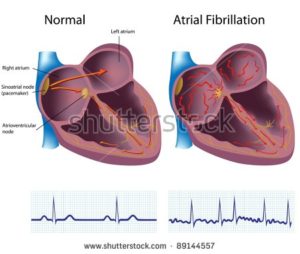Atrial fibrillation (AF) in patients without stroke is independently associated with cognitive decline, according to study results published in the European Journal of Neurology

I developed chemo-induced atrial fibrillation in the fall of 2010 and I’ve been working to heal my chemobrain ever since this side effect was diagnosed in 2005. When I came across the study linked below associating A-fib with cognitive decline I thought I should blog about the issues.
As a cancer survivor and cancer coach I make it my business to exercise, eat cleanly, supplement, etc. In short, I work hard to not relapse, develop a treatment-related secondary cancer and make the best of the permanent side effects that I incurred in ’94-’97 while going through conventional therapies for my cancer.
As such, as far as I can tell from various studies about my a-fib, I have no other co-morbidities and I live a lifestyle that should minimize my risk of further weakening of my heart muscle or weakening of my brain muscle.
Do you have atrial-fibrillation? Cognitive decline? To learn more about evidence-based non-toxic therapies to help manage your symptoms, scroll down the page, post a question or comment and I will reply to you ASAP.
Thank you,
David Emerson
- Cancer Survivor
- Cancer Coach
- Director PeopleBeatingCancer
“Atrial fibrillation (AF) in patients without stroke is independently associated with cognitive decline, according to study results published in the European Journal of Neurology…
On the basis of the findings, the investigators concluded that patients with AF should be screened for cognitive decline, given that “several mechanisms may explain the association between AF and cognitive impairment, such as silent cerebral infarct, microemboli, microbleedings and cerebral hypoperfusion.”
“People with mild cognitive impairment are more forgetful than normal for their age, but they don’t experience other cognitive problems associated with dementia, such as disorientation or confusion about routine activities…
About one in five older adults has some type of mild cognitive impairment. In a 2010 study of nearly 2,000 people, about 16 percent of dementia-free people over age 70 were suffering from mild cognitive impairment…
What may help
Researchers have discovered that activities such as exercise and computer use may prevent mild cognitive impairment. In a 2010 Mayo Clinic study, adults between ages 70 and 90 who participated in moderate physical exercise like brisk walking or biking and used a computer were less likely to develop mild cognitive impairment…
Another Mayo Clinic study found that consuming more heart-healthy mono- and polyunsaturated fats reduced the risk of mild cognitive impairment among people age 70 and older. These fatty acids—which are found in olive oil, nuts, seafood, and vegetable oils—appear to prevent inflammation and reduce the risk of blood clots, stroke, and heart disease...”




